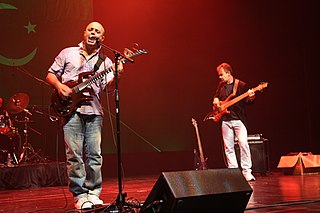
Junoon is a Pakistani sufi rock band from Lahore, Punjab, Pakistan, and Tappan, New York, formed in 1990. The band is directed by founder, lead guitarist and songwriter, Salman Ahmad, who was soon joined by keyboardist Nusrat Hussain, bass guitarist Brian O’Connell and vocalist Ali Azmat. Junoon is Pakistan's and one of South Asia's most successful bands. Since their inception, the group has released a total of nineteen albums: seven studio albums; one soundtrack; two live albums; four video albums; and five compilations. They have sold over 30 million records worldwide.

Ali Azmat Butt is a Pakistani singer-songwriter, musician and actor. He is best known as the lead singer for the influential Sufi rock band Junoon and for his subsequent solo career later followed by a career as an actor as well.

Azadi is the fourth studio album and the fifth overall album of the Pakistani sufi rock band, Junoon. The album was released in 1997 and established the Sufi rock sound that the band pioneered on their previous album, Inquilaab. The album was popular worldwide, bringing fame to Junoon.
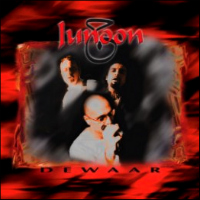
Dewaar is the seventh studio album and the thirteenth overall album of the Pakistani band, Junoon released in 2003. This was the last studio album released by the band after which both vocalist, Ali Azmat and bassist, Brian O'Connell, left the band.

Millennium 1990-2000 is the second compilation album and the seventh overall album released by Pakistani rock band, Junoon. It was released in 2000. The album features some best songs of band. It also includes two live versions of "Allah Hu", "Lal Meri Pat". It includes emotive song "Azadi" from the movie based on the life of Quaid-e-Azam Mohammad Ali Jinnah, the founder of Pakistan. The song is a tribute to Jinnah and his work towards the creation of Pakistan. "Azadi" is followed by Neend Ati Nhin one of Junoon's early hits. It also features sufi songs such as Ghoom which has an emotive guitar solo and emotive vocals. It has Junoon's patriotic song Jazba-e-Junoon which was released as single for the 1996 Cricket World Cup. Released in 2000 album was received well in Pakistan.
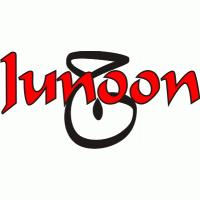
Junoon is a Pakistani sufi rock band founded in 1990 by lead guitarist and only original member, Salman Ahmad. The band has released seven studio albums, as well as numerous live albums, compilations, singles, video albums, music videos, and soundtracks. Keyboardist Nusrat Hussain left the band after the first studio album release and was replaced by bassist Brian O'Connell. They released their self-titled debut album in 1991; which barely made a dent in the Pakistani music industry. Guitarist Mekaal Hasan and band producer John Alec replaced O'Connell, and have been playing bass for live shows since O'Connell's departure.
"Jazba-e-Junoon" is a song by the Pakistani sufi rock band Junoon. It is the thirteenth and final track from the band's album third album, Inquilaab (1996), released on EMI Records. Written by lead vocalist and guitarist Salman Ahmad and it is the lead single on the album, the song uses blending of rock guitars and bluesy vocals with eastern elements like the use of tablas, raga-inspired melodies and traditional Pakistani folk music.
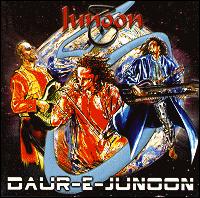
Daur-e-Junoon is the second live album and overall the twelfth album released by the Pakistani rock band, Junoon. The album was released on March 29, 2002.

Dewaar: The Best of Junoon is the third compilation album and the fourteenth overall album released by Pakistani rock band, Junoon. The album is produced by the band vocalist and lead guitarist, Salman Ahmad.
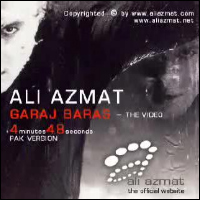
"Garaj Baras" is the seventh track on the 2003 album Dewaar by the sufi rock band Junoon. The song is written by the band's vocalist, Ali Azmat and lyricist, Sabir Zafar. The single was selected as part of a Bollywood movie soundtrack in 2003 for the film Paap directed by Pooja Bhatt. The song topped the charts in both India and Pakistan in 2004.

Strings was a Pakistani pop/rock band composed of two members, plus four live band members from Karachi, Pakistan. The band was initially formed by four college students—Bilal Maqsood, Faisal Kapadia (vocals), Rafiq Wazir Ali (synthesizer) and Kareem Bashir Bhoy —in 1988. In 1992 the quartet disbanded, only to make a comeback with Maqsood and Kapadia in 2000. While the initial band rode the new wave of Pakistani pop music, the later lineup ushered a revival in the Pakistani music industry.
Inquilaab – The Story of Junoon is a 44-minute radio broadcast documentary presented by Omar Bilal Akhtar, broadcast on City FM 89, on March 13, 2009. The documentary explores the journey of the South Asian rock music band Junoon and the struggle they face to become one of the biggest band in the world.
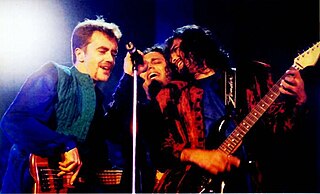
Brian O'Connell is an American multi-instrumentalist, composer, arranger, record producer and actor. He is the bassist and producer for Pakistani sufi rock band Junoon.
"Saeein" is a song by Pakistani sufi rock band Junoon. It is Junoon's eleventh single and the second from the 1996 studio album Inquilaab. The song is written by lead guitarist, Salman Ahmad and lyricist, Sabir Zafar. Due to the song's popularity, it also featured on the band's fourth studio album Azadi released in 1997. "Saeein" is one of Junoon's most popular songs, and has been covered numerous times, most notably by Indian singer Harshdeep Kaur. The song marked Junoon's foray into what later became the sufi rock sound that the band is most popularly associated with. The song uses blending rock guitars and bluesy vocals with eastern elements like the use of tablas, raga-inspired melodies, traditional Pakistani folk music, and Eastern inspired poetry.
"Meri Awaz Suno" is a song by the Pakistani sufi rock band Junoon, released in 1995. It is the second track from the band's fourth album, Azadi (1997), released on EMI Records. The song was written by lead guitarist Salman Ahmad and writer Sabir Zafar. It remains one of the band's most popular songs.
Sayonee is a song by the Pakistani sufi rock band Junoon, released in April, 1997. It is the first track from the band's fourth album, Azadi (1997), released on EMI Records. Written by lead guitarist and founder of the band Salman Ahmad and writer Sabir Zafar, it is the lead single on the album, the song uses blends of rock guitars and bluesy vocals with traditional musical elements like the tabla percussion drums, Hindustani raga-inspired melodies styled and blended into Pakistani folk music.
"Yaar Bina" is a song by the Pakistani sufi rock band Junoon, released in April, 1997. It is the fourth track from the band's album fourth album, Azadi (1997), released on EMI Records. Written by lead guitarist and founder of the band Salman Ahmad and writer Sabir Zafar, it is one of the lead single's on the album, the other being "Sayonee", the song uses blending of rock guitars and bluesy vocals with eastern elements like the use of tablas, raga-inspired melodies and traditional Pakistani folk music.
"Bulleya" is a song by the Pakistani sufi rock band Junoon, released in 1999. It is the first track from the band's fifth album, Parvaaz (1999), recorded at Abbey Road Studios, London and released on EMI Records. The song is a famous kafi written by the sufi saint Bulleh Shah. Bulleh Shah is famous for his spiritual and metaphysical poetry, and Bullah Ki Jaana is one of his well-known poems. The song is composed and produced by lead guitarist and founder of the band Salman Ahmad. It is the lead single on the album, the song uses blending of rock guitars and bluesy vocals with eastern elements like the use of tablas, raga-inspired melodies and traditional Pakistani folk music.
Sabir Zafar is a leading poet and lyricist in Pakistan. He has written songs for many Pakistani films, singers such as Nazia Hasan, Sajjad Ali, Ali Azmat and his band Junoon, as well as many successful TV drama serials. He was awarded a Tamgha-e-Imtiaz by the Government of Pakistan in 2010.











